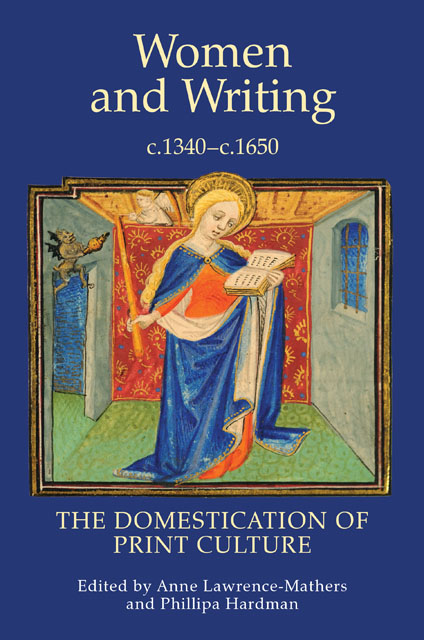Book contents
- Frontmatter
- Contents
- List of Plates
- List of Contributors
- Abbreviations
- Introduction
- Domestic Learning and Teaching: Investigating Evidence for the Role of ‘Household Miscellanies’ in Late-Medieval England
- Domesticating the Calendar: The Hours and the Almanac in Tudor England
- ‘a briefe and plaine declaration’: Lady Anne Bacon’s 1564 Translation of the Apologia Ecclesiae Anglicanae
- Frances Wolfreston’s Chaucer
- Commonplace Book Culture: A List of Sixteen Traits
- Women, Politics and Domesticity: The Scribal Publication of Lady Rich’s Letter to Elizabeth I
- ‘yr scribe can proove no nessecarye consiquence for you’?: The Social and Linguistic Implications of Joan Thynne’s using a Scribe in Letters to her Son, 1607–11
- Fathers and Daughters: Four Women and Their Family Albums of Verse
- The Book as Domestic Gift: Bodleian MS Don. C. 24
- ‘like hewen stone’: Augustine, Audience and Revision in Elizabeth Isham’s ‘Booke of Rememberance’ (c. 1639)
- Female Voices in Early Seventeenth Century Pamphlet Literature
- Select bibliography
- Index
- Misscellanious Endmatter
Fathers and Daughters: Four Women and Their Family Albums of Verse
Published online by Cambridge University Press: 01 March 2023
- Frontmatter
- Contents
- List of Plates
- List of Contributors
- Abbreviations
- Introduction
- Domestic Learning and Teaching: Investigating Evidence for the Role of ‘Household Miscellanies’ in Late-Medieval England
- Domesticating the Calendar: The Hours and the Almanac in Tudor England
- ‘a briefe and plaine declaration’: Lady Anne Bacon’s 1564 Translation of the Apologia Ecclesiae Anglicanae
- Frances Wolfreston’s Chaucer
- Commonplace Book Culture: A List of Sixteen Traits
- Women, Politics and Domesticity: The Scribal Publication of Lady Rich’s Letter to Elizabeth I
- ‘yr scribe can proove no nessecarye consiquence for you’?: The Social and Linguistic Implications of Joan Thynne’s using a Scribe in Letters to her Son, 1607–11
- Fathers and Daughters: Four Women and Their Family Albums of Verse
- The Book as Domestic Gift: Bodleian MS Don. C. 24
- ‘like hewen stone’: Augustine, Audience and Revision in Elizabeth Isham’s ‘Booke of Rememberance’ (c. 1639)
- Female Voices in Early Seventeenth Century Pamphlet Literature
- Select bibliography
- Index
- Misscellanious Endmatter
Summary
This essay considers women’s participation in the copying, transmission and possible composition of verse as witnessed by three manuscripts belonging to the later sixteenth and early seventeenth centuries. Each of the manuscripts was used by one or more women to copy and preserve family collections of verse, and each suggests familial and, in these cases, particularly paternal, support for daughters’ participation in, and enjoyment of, the circulation and writing of secular verse. The women involved were all daughters of practising poets: Francis and Ellina Harington, daughters of Sir John Harington; Mary Maitland, daughter of Sir Richard Maitland, and Lucy Davies, daughter of Sir John Davies. I shall argue in each case that participation in the copying and collecting of verse, much of it written by fathers and, in the case of the Harington daughters, a grandfather, not only fostered familiarity with the writing of verse, but may also have encouraged composition by the women themselves. However, women’s writing in manuscript miscellanies of the period may often leave no more than elusive and ambiguous traces. Sara Dunnigan, writing on Mary Maitland’s manuscript, admits that ‘in reconstructing women’s role in the production of … literature, a measure of creative licence must be allowed’. In what follows I shall have to claim my fair share of ‘creative licence’.
Family support and writing women
Women poets often acknowledge, explicitly or implicitly in their work, the importance of familial support for their writing. Germaine Greer long ago painted an image of the lonely early-modern woman writer whose poetry ‘probably ended … in the fire, burned by their authors if not by the people they addressed’. This stereotype has long since been challenged by scholars of women’s writing. We cannot know about the poetry that perished in the fire, but works that survive often point to the crucial importance of social and/or familial support for women writing. Well-known cases can be easily adduced, most notably Mary Wroth’s debts to the writings of her father and uncle and to the role model of her aunt, the countess of Pembroke. Although she did not acknowledge the support of her own family members, Aemilia Lanyer paid tribute to the supportive encouragement of an employer and her daughter, the countess of Cumberland and Anne Clifford.
- Type
- Chapter
- Information
- Women and Writing, c. 1340-c. 1650The Domestication of Print Culture, pp. 146 - 161Publisher: Boydell & BrewerPrint publication year: 2010



